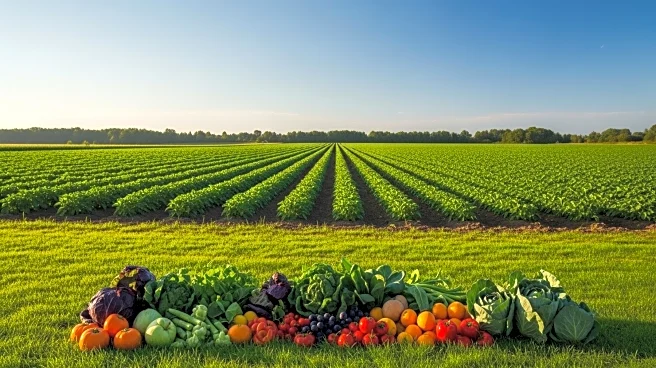What's Happening?
Regenerative agriculture, a farming practice focused on soil health and biodiversity, lacks a clear definition, leading to confusion and disputes among certifying bodies. The term 'regenerative' is often used without a foundation of organic, chemical-free practices, causing concern among consumers and industry leaders. California is the first U.S. state to define regenerative agriculture formally, but this definition applies only to government funding eligibility. Whole Foods Market, a leading natural grocer, accepts multiple certifications for regenerative agriculture, but not all require organic practices. This has led to debates about the integrity and meaning of 'regenerative' in the marketplace.
Why It's Important?
The lack of a standardized definition for regenerative agriculture affects consumer trust and market dynamics. As the movement gains traction, clear guidelines are essential to prevent greenwashing and ensure that products meet consumer expectations for environmental and health benefits. The debate over organic versus regenerative practices impacts farmers, retailers, and consumers, influencing purchasing decisions and agricultural policies. The issue also highlights the need for regulatory oversight to maintain the credibility of environmental claims and support sustainable farming practices.
What's Next?
The USDA has not yet regulated regenerative agriculture claims, leaving responsibility to grocery stores and certifying bodies. Whole Foods Market's approach to accepting multiple certifications may set a precedent for other retailers. The Regenerative Organic Alliance plans to introduce a 'Journey to ROC' program to support farmers transitioning to regenerative practices. The Federal Trade Commission is reportedly preparing to update its Green Guide, which could impact how environmental claims are regulated. These developments may lead to more clarity and consistency in the use of 'regenerative' in agriculture.
Beyond the Headlines
The debate over regenerative agriculture reflects broader challenges in defining and implementing sustainable practices. It raises questions about the role of government versus private entities in setting standards and the balance between innovation and regulation. The movement's growth could influence global agricultural policies and consumer behavior, emphasizing the importance of transparency and accountability in environmental claims. The discussion also touches on ethical considerations, such as the impact of farming practices on human health and ecosystems.










